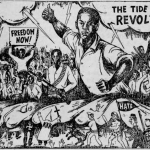
Has Universality Ever Been Abstract? An FAQ
A majority of the Left has turned its back on the universal, without wanting to know what potentialities it could have for struggle.

A majority of the Left has turned its back on the universal, without wanting to know what potentialities it could have for struggle.

On July 14, 1789, the people of Paris stormed the Bastille fortress, initiating a political sequence that abolished feudalism, overturned the monarchy, and established popular sovereignty.

Identifying and distinguishing trends in the evolution of management science is key to understanding how workers today should aim to organize resistance at the point of production.

On this Fourth of July 1964 when White America celebrates its Declaration of Independence from foreign domination one hundred and eighty-eight years ago, we of the Revolutionary Action Movement (RAM) congratulate the Vietnamese Front of National Liberation for their inspiring victories against U.S. imperialism in South Vietnam and thereby declare Our Independence from the policies of the U.S. government abroad and at home.

When the call is made to free Harlem, New York, to free 12th Street here in Detroit and all the other 12th streets around the country, send for me.

The question is how to develop, today in Chile, an anti-capitalist left, not dogmatic or sectarian or electioneering or opportunistic, able to debate a political program of clear rupture, but also helping in the short term to develop the unitary action, on the social and political front, which is useful for strengthening popular movements.

Specifying the relationship between the logical and historical dimensions of capitalism is one of the most controversial problems in Marxist theory, and one about which I am very uncertain. Can we claim that gender oppression is a necessary feature of capitalism and, if so, at what level of abstraction can we make that claim?

It once was common practice for radical journals to solicit feedback from their readers. It anchored theoretical developments and pointed to new areas of inquiry. As Viewpoint expands its work, we hope our readers can help us revive the practice here.

If precarity is in fact rising and the conditions of the working class have radically changed, then we simply cannot re-apply the same inherited political strategies, but have to find new ones.

Whereas the traditional, teleological narrative would see “maturity” as putting all eggs in the one party’s basket, then, Spanish movements hedged their bets, creating an ecology of alternatives that, by balancing each other, increase the possibility of social control.